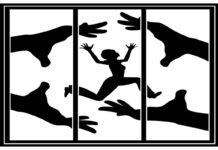Irish Open Dialogue Shut Down—Despite Expert Report Stating It Should Be Scaled Up
The value-base and proven positive outcomes of Open Dialogue need to be expanded, not closed.
How to Learn to Love to Write: A Mental Health Journey
You go from enjoying writing to dreading the idea of ever scribbling words on a piece of paper ever again. What was once your escape has now become your prison.
Prescription Drugs Are the Leading Cause of Death
Overtreatment with drugs kills many people, and the death rate is increasing. Why have we allowed this drug pandemic to continue?
What Is “Care” in a Psychiatric Medical Camp for the Unhoused in India?
Indian doctoral scholar Neha Jain wonders what kind of ‘care’ and ‘help’ are possible in the absence of real consent.
A Felt Sense of Safety – From Disassociation to Embodiment
I know now that I can trust myself and listen to my intuition. Within the mental health system, I trusted everyone but myself.
Witless and Dangerous? Challenging the Assumptions of the ‘Schizo’ Paradigm
Despite growing awareness that ‘schizophrenia’ is not a scientifically valid concept, the old assumptions still drive clinical practice.
When Medication Changes More Than Symptoms: Antipsychotics’ Effect on Identity
Recent research reveals how antipsychotic medications can significantly impact users' identity and self-image, challenging existing clinical approaches.
Tapering Strips: A Practical Tool for Personalised and Safe Tapering of Withdrawal-Causing Prescription Drugs
Tapering strips are one of the practical tools mentioned in the new Maudsley Guidance.
Antidepressant Trials “Hijacked for Marketing Purposes,” Researchers Say
About half of the large antidepressant trials are biased enough to be considered “seeding trials,” according to the researchers.
From the Dopamine Theory to the Outcomes Paradox
Why does long-term use of neuroleptics correlate with poorer social and occupational outcomes?
Engaging Voices, Part 2: Working Our Way Toward Connection
Sam Ruck shares his fourth excerpt from his book Healing Companions, which describes his life with, and love for, his wife and her “alters.”
The Significance of Semiotics in Social Work
Mental health treatment requires more than words; it demands a deep understanding of the unspoken, the symbols and signs that permeate our lives.
Study Links Prenatal Antipsychotic Exposure to Developmental Delays and ADHD
A comprehensive review indicates that children exposed to antipsychotics in the womb face an increased risk of ADHD and developmental delays.
Giving Caregivers a Platform: Meagan, Mother of Matt
A mom describes her son's descent into the harms of psychiatry—and his way out. "It was really difficult to watch Matt decline. He had given up hope that he could get well."
Unbecoming
If the wounded healer doesn't work on their wounds, they become the wounded wounder, keeping the client and themselves trapped in their roles.
On the Brink of Murder Because of an Antidepressant
After being put on antidepressants, Katinka started hallucinating wildly, thinking in very violent images.
Bad Science Revisited: “The Bell Curve” Turns 30
Critiquing the wildly popular 1994 eugenicist book, which purported to link IQ and race, by reviewing the supposed genetic evidence.
Long-term Outcomes Better for Those Who Stop Taking Antipsychotics
Research undermines the prolonged use of antipsychotics in schizophrenia treatment, suggesting improved social functioning and quality of life with discontinuation.
Szasz and the Liberation of the “Mental Patient”
By setting standards of equality, competence, and accountability, Szasz worked for the liberation of the "mental patient.”
The Experience of Survivors of Psychiatry in Brazil
The suffering caused by physical, sexual or psychological violence, common in women's lives, is pathologized by psychiatry.
Medical Journals Refuse to Retract Fraudulent Trial Reports That Omitted Suicidal Events in Children
The published articles underreported suicide-related events and provided false claims that the drugs were effective.
Undisclosed Financial Conflicts of Interest in the DSM-5: An Interview with Lisa Cosgrove and...
On the Mad in America podcast we talk with Lisa Cosgrove and Brian Piper about their BMJ paper entitled "Undisclosed Financial Conflicts of Interest in the DSM-5 TR: Cross-Sectional Analysis"
From a Paranoid Schizophrenia Diagnosis to a Peer Researcher in Nigeria
The mental health system needs to adopt the principle of holistic care, promoting fundamental rights and the relevance of family support.
Beyond Greenspaces and Mental Health: The Power of the Wild
Tensions of sustainability, climate change, and global mental health: grassknots, greenspace, and climate psychology.
Withdrawal Psychosis and the Aftermath of Tragedy
I wake to what has happened every day, and must filter my every action through the memories and the fallout of what I did when I was psychotic as a twenty-four-year-old kid.

































